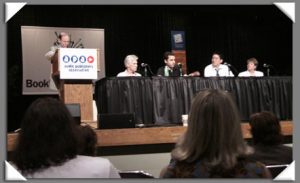Over the past several years, I have checked with several local colleges — especially those with pro audio curriculums — to see if I could take a course in audio engineering as a non-degree student. I have a Masters degree in computer information systems, so I’m really don’t want to spend a lot of time and money to pursue another degree! I therefore was quite excited to discover a 4-week course in Pro Tools offered this month by the Art Institute of Atlanta.
This class couldn’t occur at a better time for me. I recently switched my voice-over studio configuration from a PC with Cool Edit software to a Macbook Pro with Pro Tools LE. Earlier this year, I hired a recording engineer to help me streamline my processes. After I bought this computer, he gave me a crash course in using Pro Tools, but I have much to learn about the program.
The first class was held this past Saturday. I am the only voice talent in the group. Most of the students are singer/songwriters, which is understandable when you consider that Atlanta is a thriving music city and home to a Grammy chapter and numerous Grammy winners.
One of my fellow students said he was in a band that had been signed by a minor label. He was wearing the t-shirt for a very famous band. I asked him why he wasn’t wearing a shirt to promote his own band. His answer surprised me.
He told me that it’s an unwritten rule that you don’t wear the shirt to promote your own band.
I told him when you get to be my age (not that I’m that old!), you don’t worry about so-called rules that are based on what other people think about you. I continued, saying that t-shirts are great advertising as you become a walking billboard. People who don’t read anything else will read the words on a t-shirt. I have t-shirts promoting my voice-over business. I usually make a point to wear one when I’m walking some place with a lot of people, like through the Atlanta airport!
As we had this discussion, I was holding a pen imprinted with my name, logo and phone number. My business cards were in my purse, ready to hand out at a moment’s notice. Before leaving home, I thought about wearing my digital ID badge to the class but decided against it since I did not expect a large group. I wasn’t taking enough stuff to warrant use of my imprinted duffle bag.
Marketing books and advisors will tell you that it takes an average of 5-7 contacts with a prospect before they recognize your name and business. Living in the information age means that we are all bombarded with messages from every corner. Creativity and persistence are required in order to get your message across to your intended audience.
Effective branding occurs in part because the prospect receives the same message and graphics in a variety of formats. Part of your branding efforts illustrate characteristics that distinguish you from competitors. Since people make purchasing/hiring decisions based on emotions, you can highlight certain attributes to enhance your brand and appeal to your target market. Terrific voice talent and super nice guy Bob Souer alerted me to an excellent article from Grokdotcom that illustrates this point.
I vividly remember the design of my classmate’s t-shirt. The name of the band is emblazoned in my mind. However, I couldn’t tell you the name of my classmate’s band. He said it once, and like anyone else, I have other things to think about and remember.
Any person in business — particularly in a creative industry like voice-over — should not be afraid to promote themselves. If other people make negative remarks about my efforts, I consider the source. Is the speaker someone I know and respect? Has that person built a business, particularly one in voice-over? Does that person actively promote themselves, or do they sit and wait for somebody else to do the job for them?
In the end, one of the best parts about owning my business is that I only have to please ME!
No one can promote me and my business better than me.
I have reaped the rewards from being a non-conformist with my promotion and publicity efforts.
Speaking of self-promotion, I am excited to announce that I was selected as a finalist in the Voices.com 60-Second Pitch contest! I posted
I created the pitch using my PC, but I am now creating my recordings on my Mac. Pro Tools is a challenge to learn, but it’s yet another distinguishing trait that I can use in my branding. It is the industry standard software for a reason, and using it means that I will have the capability to transfer session files with my clients. I’m looking forward to gaining in proficiency over the next several weeks while I’m in the class.
By the way, I have already planned my wardrobe for the class this Saturday. Can you guess what I’ll wear? 🙂




